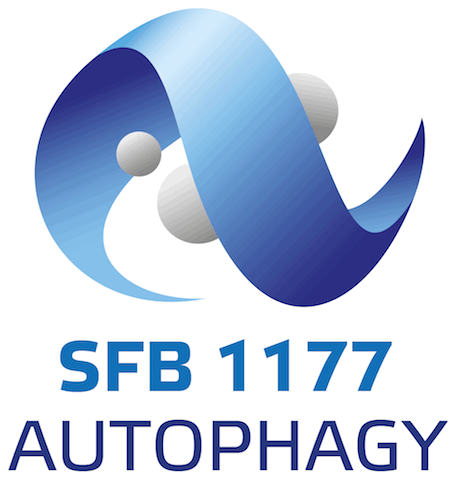
Molecular & Functional
Characterization of Selective Autophagy
SFB 1177
EVENTS
NEWS
ABOUT US
Autophagy is a highly conserved catabolic process that serves as a quality control mechanism in cells by selectively removing damaged and superfluous organelles or other harmful cytosolic material, such as aggregated proteins or invaded bacteria. Under stress or energy restriction autophagy provides recycled building blocks for the synthesis of new cellular components. Three different types of autophagy can be distinguished: macroautophagy, microautophagy and chaperone-mediated autophagy. This SFB focuses on macroautophagy (hereafter referred to as autophagy), a multi-step cellular process by which cytosolic material is engulfed by a double-membrane, termed autophagosome after closure, which eventually fuses with a lysosome in order to eliminate its content. Autophagy plays a vital role in protecting against disease, but in recent years it became clear that the effect of autophagy is highly contextual. While it acts for instance as an anti-tumorigenic mechanism in healthy cells, cancer cells exploit the cytoprotective effect of autophagy to overcome stress conditions and nutrient limitation caused by rapid tumor growth. SFB 1177 aims at gaining a more detailed insight into the mechanistic details of autophagic pathways to better understand its role in disease development and eventually exploit this knowledge therapeutically.
EDUCATION
We aim to ensure a comprehensive, high-level education of PhD students and postdocs and provide a platform encouraging new ideas, concepts, and collaborations. The curriculum includes several modules:
IRTG lectures: Two Interdisciplinary Seminar Series on Biochemistry and Technology, both designed along the key research issues of SFB 1177 and held by the project leaders.
Lab Rotations to deliver hands-on training and experience in a wide range of technologies.
SFB 1177 seminars: The Autophagy Club lecture series (with internationally renown guest speakers).
Complementary Academic Training covering transferable skills.
The curriculum is complemented by a regular retreats and continuous career mentoring. The IRTG is well embedded in the already existing efforts at Frankfurt and Mainz universities for structured PhD education: Courses from Goethe Graduate Academy (GRADE) and the General Postgraduate Program (GPP) are implemented in the IRTG schedule.
Fellowships:
For the initial financing of new projects within the autophagy field, the SFB awards six-month fellowships to qualified candidates throughout the year. Group leaders should direct their applications to the coordinator of the SFB 1177.












